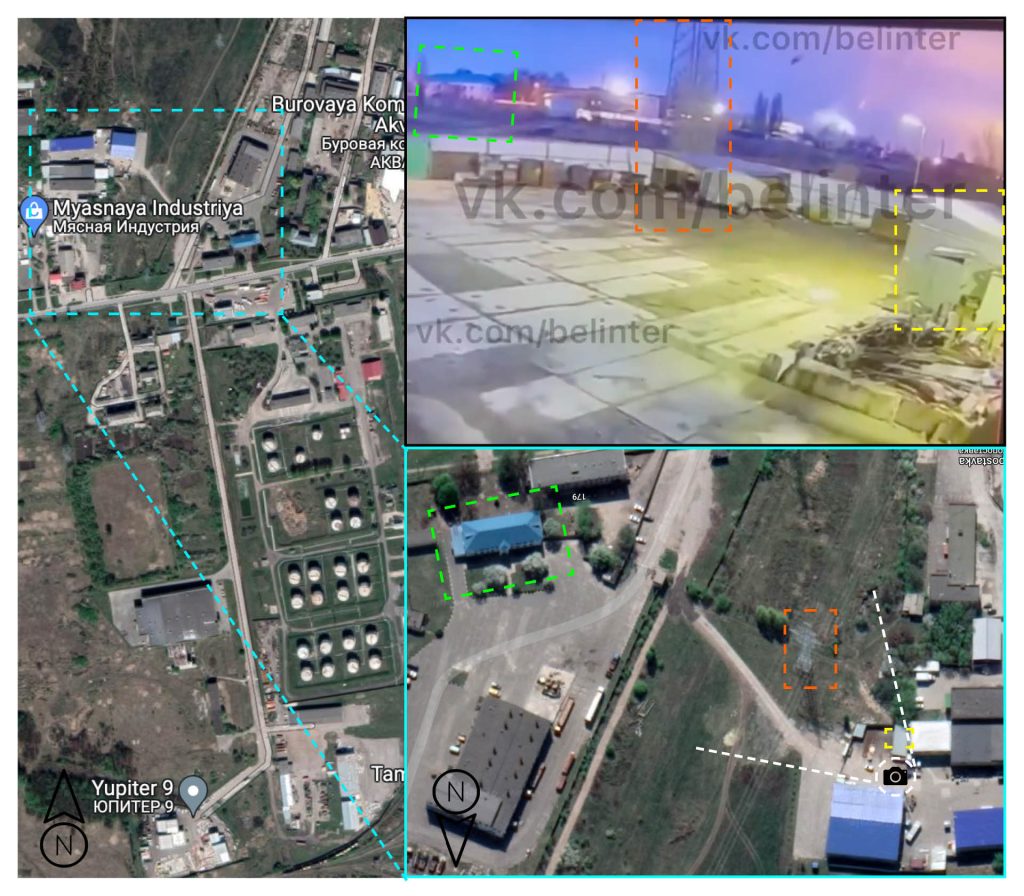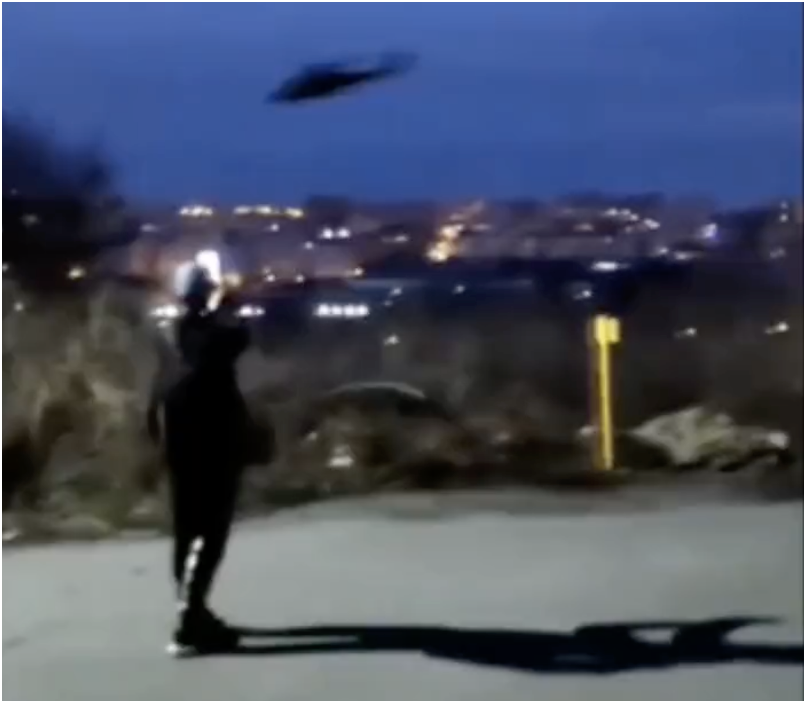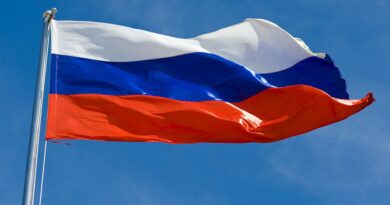Russian War Report: Videos appear to show missiles striking Russian oil depot
As Russia expands its assault on Ukraine, the Atlantic Council’s Digital Forensic Research Lab (DFRLab) is keeping a close eye on Russia’s movements across the military, cyber, and information domains. With more than five years of experience monitoring the situation in Ukraine, as well as Russia’s use of propaganda and disinformation to undermine the US, NATO, and the European Union, DFRLab’s global team presents the latest installment of the Russian War Report.
Security
Videos appear to show missiles striking Russian oil depot
South Ossetian soldiers depart Ukraine, returning to Georgia
Tracking narratives
Russia falsely accuses Hunter Biden of funding Ukrainian biolabs – again
Poll suggests Putin’s popularity is rising in Russia
Media policy
Russia’s IT regulator attempts to silence Wikipedia for the second time
Documenting dissent
Russians condemning the war in Ukraine face harsh backlash
International response
South Ossetia announces plans to unify with Russia as Abkhazia intends to remain independent
Videos appear to show missiles striking Russian oil depot
On April 1, reports and videos surfaced online showing a possible attack on Russia’s Belgorod oil depot. The facility in question is located roughly thirty-five kilometers from the border with Ukraine. While facility owner Rosneft gave no information about the cause of the fire, Belgorod Governor Vyacheslav Gladkov blamed the attack on the Ukrainian Armed Forces, Reuters reported. “Ukraine’s foreign minister, Dmytro Kuleba, said he could not confirm or deny reports of Ukrainian involvement in the strike as he did not have military information,” the report added. “The Ukrainian Defense Ministry and the general staff did not respond to requests for comment.”
In one video, several missiles appear to strike the facility as two helicopters fly over it. The DFRLab geolocated the video and confirmed that it was filmed just north of the Belgorod oil refinery. According to timestamps on CCTV footage from the scene, the attack was carried out around 5:43am local time.


Other videos and drone footage of the oil depot showed several fires at the site. There is speculation that an attack was carried out by two Mi-24 attack helicopters, launching multiple S-8 unguided missiles. This is supported by footage that shows helicopters flying at a low altitude.
—Lukas Andriukaitis, Associate Director, Brussels, Belgium
South Ossetian soldiers depart Ukraine, returning to Georgia
On March 31, reports emerged in Georgian Telegram channels that up to 300 South Ossetian soldiers left their posts and hitchhiked back home after being sent to fight against Ukraine. The former president of the Russian-occupied region of South Ossetia, Eduard Kokoity, confirmed that some soldiers had traveled back to South Ossetia. “Nobody has the right to judge these guys or accuse them of cowardice,” Kokoity said. “We need to look at the root causes of what happened and find out how their participation was organized. We will deal with this in the most serious manner.”
Images circulated in Telegram channels allegedly depict the returned South Ossetian soldiers near the Russia-South Ossetia border. The DFRLab geolocated the images to Nizhny Zaramag, a border checkpoint between South Ossetia and North Ossetia.
The Telegram channel VChK-OGPU (ВЧК-ОГПУ), which describes itself as a platform exposing the “secrets of officials, oligarchs, gangsters, and strongmen,” offered an explanation for the South Ossetian soldiers’ return. According to the channel, the soldiers did not run away but were brought back by Kokoity. The channel claims that the soldiers sent to Ukraine were listed as volunteers and not as servicemen of the Russian 58th Army. In addition, the soldiers reportedly lacked bulletproof vests and traveled to Ukraine without weapons or equipment. At this time, the DFRLab cannot independently verify these claims.
—Sopo Gelava, Research Associate, Tbilisi, Georgia
Accusations fly as Russian deputy threatens Azerbaijan with nukes and Azerbaijan puts him on Interpol wanted list
On Monday, the Armenian Ministry of Foreign Affairs announced that it would launch an investigation into the actions of the Russian peacekeeping contingent in Nagorno-Karabakh. The decision came after the Russian Ministry of Defense accused Azerbaijan of violating the Nagorno-Karabakh peace agreement by occupying the village of Parukh (Farukh in Azerbaijani) before eventually evacuating it. The Azerbaijani Ministry of Defense accused Russia of spreading false claims, saying they had not evacuated the village, while Armenia expressed frustration at Russia for making the same claim. This indicates that Armenia and Azerbaijan both have concerns about Russian peacekeepers, who have been deployed in Nagorno-Karabakh since November 2020, following a six-week war between Azerbaijan and Armenia.
The previous day, Mikhail Delyagin, Deputy Chairman of the Committee on Economic Policy in the Russian State Duma, escalated matters when he told the Rossiya24 TV show “60 Minutes” that Russia needed to “punish Baku” because Azerbaijan aggravated the situation in Nagorno-Karabakh while Russia is occupied with Ukraine. Following the broadcast, Delyagin posted a poll on his Telegram channel with the question: “Do you think it would be justified to use tactical nuclear weapons to eliminate the oil industry of Azerbaijan due to its aggression triggered by belief in the powerlessness of Russia, whose military resources are diverted to Ukraine?” As of March 31, more than 21,000 users had voted in the poll, with 56 percent of them selecting “no, it is unacceptable” and 31 percent selecting “yes, this is necessary – Turkish proxies in Baku will not understand anything else.”
In response to the provocative poll, Azerbaijan’s Prosecutor General’s Office has opened a criminal case against Delyagin and added him to an international wanted list through Interpol. Azerbaijan is charging Delyagin with using the media to call for aggressive war; threats to commit an act of terrorism; and incitement of national hatred by threatening the use of force. The prosecutor’s office stated that Azerbaijan had sent requests to several partner countries to arrest and extradite Delyagin if he traveled to their territory.
Delyagin has since apologized for his statement and claimed the comments and Telegram poll were not addressed to the Azerbaijani people or state, but targeted at a part of the Azerbaijani bureaucracy, which he said had decided to take advantage of Russia’s focus on Ukraine and neglect its peacekeepers in Nagorno-Karabakh.
On March 28, the Press Council of Azerbaijan criticized Russia for blocking Azerbaijani media outlets due to their reporting on Ukraine. The council said that Azerbaijani media websites were blocked because Russia is unhappy with them taking an objective position on the Russia-Ukraine war. The council underlined that Russia neglects freedom of speech and expression and prevents Russians from receiving objective information. After Russia invaded Ukraine, Russian censor Roskomnadzor blocked access to four Azerbaijani media websites, including Haqqin.az, Minval.az, baku.ws, and Oxu.az. Some news organizations said their websites were blocked without any formal notice from Roskomnadzor. In response to Roskomnadzor’s actions, Azerbaijan’s Ministry of Digital Development and Transport hinted that it might block Russian media websites if they disseminate information against Azerbaijan’s interests and territorial integrity.
—Givi Gigitashvili, Research Associate, Warsaw, Poland
Russia falsely accuses Hunter Biden of funding Ukrainian biolabs – again
The Russian Ministry of Defense is attempting to breathe new life into the debunked conspiracy theory that the US and Ukraine are using biolabs to weaponize deadly viruses. In the latest iteration of the conspiracy, the Russian MoD claims that Hunter Biden, son of US President Joe Biden, is working with the Pentagon to fund a “military biological program in Ukraine.” The Russian MoD prepared slides that allegedly connected the US president’s son with “secret biolabs” in Ukraine.
In the slides, the Russian MoD shared biographies of Americans it believes are working on the biolabs program, including US Defense Threat Reduction Agency staff. The slides also included several images of documents that are difficult to read due to their size. Among these were one titled, “Risk evaluation of dangerous pathogens transmitted by birds during migration,” while another focused on the potential epidemiological threat of laboratory research taking place in Kherson. The slides also shared an authentic US patent for a mosquito-delivering drone called a “toxic mosquito aerial release system.”
Another slide discussed Baykar, the Turkish company that produces the Bayraktar TB2 drone. A question-and-answer style document alleges to show responses from Baykar to Motor Sich, a Ukrainian airplanes engine manufacturer. The Russian MoD highlighted a question about the ability of the drone to carry and spray liquid or aerosols from a 20-liter container, implying the Ukrainians intend to use the drones to spray biological weapons. While the document’s legitimacy is questionable, Baykar’s response to the question was simply “No.” Furthermore, the document is written in Russian and English, which suggests it is not authentic as a genuine copy would more likely be written Ukrainian and English.
The biolabs conspiracy has been widely debunked. Hunter Biden’s alleged involvement was also debunked by the Washington Post. The US Embassy in Ukraine has also addressed the conspiracy by noting that its partnership with Ukraine aims to reduce biological threats.
—Roman Osadchuk, Research Associate
Poll suggests Putin’s popularity is rising in Russia
Russian President Vladimir Putin’s approval rating in the country has increased since the start of the war, according to independent Russian pollster Levada Center. The center, which Russia has labeled a foreign agent, published its latest poll on March 30.
According to the poll, Putin’s approval rating had reached 83 percent, a twelve-point rise since February. It is Putin’s highest rating since 2017, after which his popularity dropped due to pension reforms. Only 15 percent of Russians currently disapprove Putin, a 12-point decrease from February.
Meanwhile, the amount of respondents who believe that the country is generally moving in the right direction increased from 52 percent in February to 69 percent in March, while those who think it is moving in the wrong direction decreased from 38 percent to 22 percent.
Trust in Putin rose from 34 percent to 44 percent. He remains the most trusted individual in the country, followed by Defense Minister Sergey Shoigu, whose trust rating increased from 12 percent to 28 percent. Trust in Foreign Minister Sergey Lavrov, Prime Minister Mikhail Mishustin, and ultranationalist lawmaker Vladimir Zhirinovsky also rose in the latest poll.
For the first time since October 2015, the share of those who approve of the State Duma (59 percent) surpassed the share of those who do not (36 percent). Seventy percent of Russians approve of the government’s activities, while 27 percent did not, a change of 15 points in each direction since February.
—Eto Buziashvili, Research Associate, Washington DC
Russia’s IT regulator attempts to silence Wikipedia for the second time
Russian communications watchdog Roskomnadzor announced on March 31 that it is fining Wikipedia RUB 4,000,000 (more than USD $48,000) for not deleting “false information on the subject of a special military operation of the RF Armed Forces in Ukraine, aimed at misinforming Russian users.” Wikipedia’s Russian branch said that it was not clear who would be the recipient of the fine. “Perhaps it will be the Wikimedia Foundation,” the local branch speculated. Earlier, on March 29, Wikipedia’s Russian branch said it had received a notification demanding it delete the article “Russia’s Invasion in Ukraine (2022).”
This is the second time Roskomnadzor has demanded that Wikipedia delete an article about Russia’s invasion of Ukraine. On March 1, the Russian Wikipedia branch published the first notification they received from Roskomnadzor, which threatened to block Wikipedia in Russia. In response, Wikipedia published an article in Russian explaining what to do if Wikipedia is blocked.
—Nika Aleksejeva, Lead Researcher, Riga, Latvia
Russians condemning the war in Ukraine face harsh backlash
On March 31, various Telegram channels belonging to independent media outlets in Russia reported on a schoolteacher facing ten years in prison for condemning Russia’s war in Ukraine. On March 18, Irina Gen reportedly tried to explain to two of her eighth-grade students why they were prohibited from attending karate and swimming competitions in Europe. Gen became emotional and condemned Russia’s invasion of Ukraine, saying that it was “right” to ban Russia from sports competitions in Europe. “Until Russia starts behaving in a civilized way, this will continue forever,” she said.
Someone in the classroom recorded Gen’s words and submitted the audio recording to local police. On March 30, police reportedly detained her. Gen pleaded guilty and is now facing a ten-year sentence.
Elsewhere in Russia, on March 31, the documentary festival Artdocfest opened with the theme “No war!” According to Current Time, an independent television program now banned in Russia, a festival theater was evacuated fifteen minutes prior to the start of a documentary. As attendees filed out to the street, an unknown man with a coffee cup approached festival organizer Vitaly Mansky and said provocatively, “I suggest that you hold this festival in the Donbas, where people have been dying for eight years…Why didn’t you do anything there?” Mansky turned away and did not respond. The unknown man proceeded to throw a red substance from the coffee cup on Mansky’s back, as seen in a video on the pro-Kremlin RTVI Telegram channel. Later, Mansky published a video from a kitchen where the festival organizers had gathered after the incident, announcing the immediate closing of the festival. “There is no freedom beyond the kitchen in Russia,” Mansky said. The festival has faced pressure from Russian authorities since 2014.
On March 31, Anna Netrebko, a Russian opera singer, wrote on Facebook: “I expressly condemn the war on Ukraine, and my thoughts are with the victims of this war and their families.” Two days later, the Novosibirsk State Academic Opera and Ballet Theater announced that Netrebko’s June 2 concert had been canceled due to her condemnation of Russia. “We are sure that the truth is with us,” the theater’s announcement concluded. “We should not be afraid that there are cultural figures who renounce their homeland. Our country is rich with talents, and yesterday’s idols will be replaced by others with a clear civic position.”
—Nika Aleksejeva, Lead Researcher, Riga, Latvia
South Ossetia announces plans to unify with Russia as Abkhazia intends to remain independent
On March 30, Anatoly Bibilov, the Kremlin-backed leader of the Russian-occupied region of South Ossetia, said that the region will take “appropriate legal steps in the near future” to ensure unification with its “historic homeland – Russia.”
Andrei Klimov, deputy head of United Russia’s international cooperation commission, said that South Ossetia should hold a referendum to unite with Russia, Civil.ge reported. Following Klimov’s statement, Kremlin spokesperson Dmitry Peskov said that Moscow would treat the proposed referendum with respect. “We have not taken any legal or other actions in this regard. But at the same time, in this case, we are talking about expressing the opinion of the people of South Ossetia, we treat them with respect,” said Peskov.
On March 31, US State Department spokesperson Ned Price said that the US would not recognize any results “of any effort by Russia or its proxies to divide sovereign Georgian territory.” He added, “Just as the United States did not recognize Russia’s illegal seizure and attempted annexation of Crimea in 2014 and just as we did not recognize the Kremlin’s cynical attempt to recognize independence of the so-called DNR [Donestk People’s Republic] and LNR [Luhansk People’s Republic] in eastern Ukraine, just before it launched its unprovoked invasion of Ukraine, we will not recognize the results of any effort by Russia or its proxies to divide sovereign Georgian territory.”
Following the South Ossetia announcement, Aslan Bzhania, the head of occupied Abkhazia, stated that Abkhazia does not plan to join Russia and will remain independent. “Sovereign, independent Abkhazia is growing and will continue to grow brotherly, allied relations with Russia,” he added.
The previous day, RT editor-in-chief and Kremlin propagandist Margarita Simonyan visited Abkhazia. She stated in her Telegram channel that she met with Bzhania and opened a media center. She then questioned why Russia and Abkhazia needed a border crossing. “Millions of Russians who annually cross this border and our allies are now shedding blood for us,” she added. Telegram commenters supported Simonyan, replying that there should be no border between Abkhazia and Russia and that Abkhazia should follow the example of South Ossetia on becoming part of Russia. The post garnered 968 comments. Margarita Simonyan’s Telegram channel has more that 219,000 subscribers.
—Sopo Gelava, Research Associate, Tbilisi, Georgia
—Eto Buziashvili, Research Associate, Washington DC
Image: An eyewitness captures video of military helicopters approaching Belgorod, Russia. (Source: @UAWeapons/archive)



